The Rise of Climate Medicine
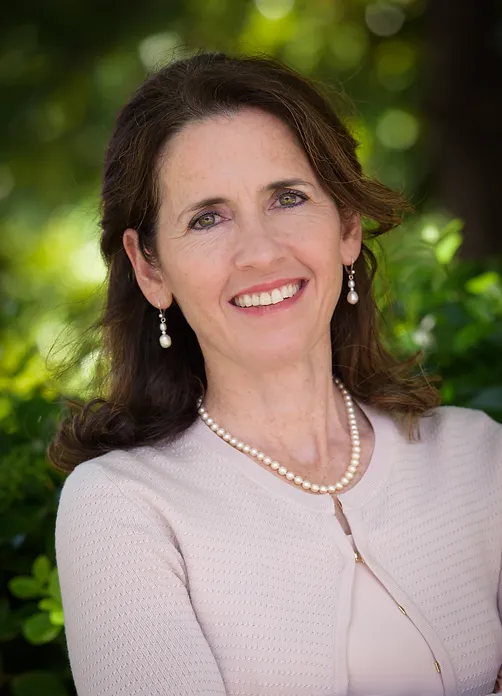
Dr. Samantha Ahdoot is a practicing pediatrician at Pediatric Associates of Alexandria and an Assistant Professor of Medical Education at University of Virginia School of Medicine. Dr. Ahdoot served as Chair of Pediatrics at Inova Alexandria Hospital from 2015-2019 and is on the Board of the Virginia Chapter of the American Academy of Pediatrics (AAP) as Environmental Champion. Dr. Ahdoot was the lead author of the AAP Global Climate Change and Children’s Health Policy Statement and Technical Report, published in Pediatrics in November 2015. She is the Chair and Founder of Virginia Clinicians for Climate Action.
“Perhaps it will be from the poets of biology that a vision of the future will come.” Salk J.E., Biology in the Future. Perspectives in Biology and Medicine. 1962;5(4):423-431.
When I passed my pediatric board exam in September 2002, I envisioned a career of check-ups and sick visits in a pediatric clinic. Asthma, infections, nutrition, vaccinations. Yet on a rainy Saturday in April, I sat in a conference room as part of UVA’s annual Protecting Health in a Changing Climate conference, listening to engineers and architects talk about air chillers, green revolving funds, and sustainable procurement guides.
Not the usual pediatrics material. Something had changed.
Over my 20-year career, as I’ve cared for kids in my pediatric office, I have also become immersed in the emerging field of climate medicine. As the Earth warms, healthcare professionals are recognizing intersections with our own work. In 2021, the UVA School of Nursing launched an annual interdisciplinary conference to help educate UVA’s medical community on this emerging topic.
Every clinician I have met in the growing community of climate and health has a story of what first alerted them to the problem. For me, it was two events over nine years. The first alarm rang in August 2002 when I was studying for my pediatrics board exam. My husband Ken and I were living near Boston with our two-month-old son, Isaac, when there was a heat wave. Boston had eight days in a row above 90 degrees, the fourth time on record for such intense, prolonged heat in the City. With no central air in our modest apartment, I brought Isaac to Starbucks to keep him cool and study. Over those eight days, between sample board questions, I read about how summers were getting hotter all over the world. I started to worry.
My concerns simmered as our family moved to Virginia, I built my pediatrics practice, and our daughter Ruby was born. Then a second alarm rang in July, 2011. The DC area had a suffocating heat wave, with a heat index reaching 121 degrees. Isaac was a 9-year-old clarinetist at band camp when I received a call from the emergency room. He had collapsed in the heat and was rushed to the hospital. When my husband arrived, Isaac was on a gurney with an IV in his arm, recovering.
That was it for me. As a pediatrician and a mom, I had to get involved.
I joined the American Academy of Pediatrics (AAP) Council on Environmental Health and, in 2013, was elected to their Executive Committee. I cautiously agreed to update their policy statement on climate change and children’s health and, for the next two years, spent two days per week at the hospital library, researching and writing. After the report release in 2015, I got involved in federal advocacy and represented the AAP on a newly formed Medical Society Consortium on Climate and Health. In 2016, I joined forces with a group of four doctors, a respiratory therapist, a clinical pharmacologist, and a hospital sustainability manager to create a new group, Virginia Clinicians for Climate Action (VCCA), to focus on state work.
Since that time, climate medicine has rapidly expanded. Leading medical journals now have dedicated initiatives on the topic, including The New England Journal of Medicine and The Lancet. Our nation’s health leadership is focusing on this challenge. The Health and Human Services Office of Climate Change and Health Equity released a Climate Adaptation and Resilience Plan in 2021. The Biden administration launched a Health Sector Climate Pledge in 2022. The Joint Commission is developing healthcare sustainability standards.
International, national, and state groups have formed dedicated to climate and health. Health Care Without Harm is the international leader in healthcare sustainability. The Columbia University Global Consortium on Climate and Health Education shares education resources from across the world. The Medical Society Consortium on Climate and Health represents every leading U.S. medical society and has helped launch groups in 23 states and Puerto Rico.
VCCA was one of the first state groups. Our initial group of eight now includes over 500 members. We advocate for state climate policy, holding a yearly advocacy day in Richmond. In 2023, we had 65 attendees and dozens of legislator meetings.
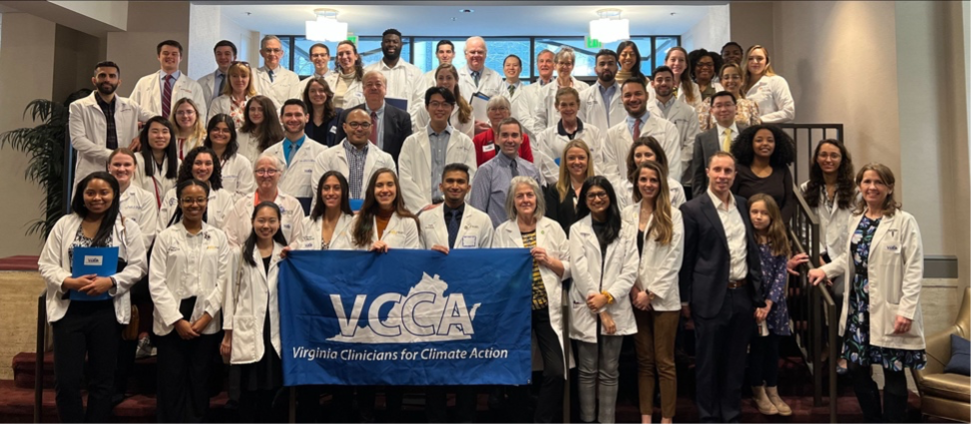
VCCA has formed community collaborations to support local climate resilience and environmental justice. We are part of a National Oceanic and Atmospheric Administration-funded program, Building Heat Resilience in Southwestern Virginia through Education, in collaboration with Carilion Clinic, Virginia Tech, and the City of Roanoke.
VCCA also develops climate and health education programming through our Virginia Climate and Health Education Collaborative. Students from across Virginia and the region meet yearly, sharing resources and inspiration to support climate health curriculum development. UVA is a leader in this effort, in large part due to student engagement.
In the summer of 2020, UVA School of Medicine 2023 graduate Lena Bischell (now a UVA Pediatrics resident) developed a climate and health course curriculum as a summer project. That curriculum became the foundation for the UVA School of Medicine Climate and Health Elective first held in 2022. This elective, led by course directors Dr. Homan Wai and myself, has filled to capacity every year with 20% of the medical school class. The two-week course covers climate change intersections with water and air quality, infectious diseases, extreme heat, food and water security, mental health, and healthcare sustainability. The highly successful course was featured in the University Sustainability Report.
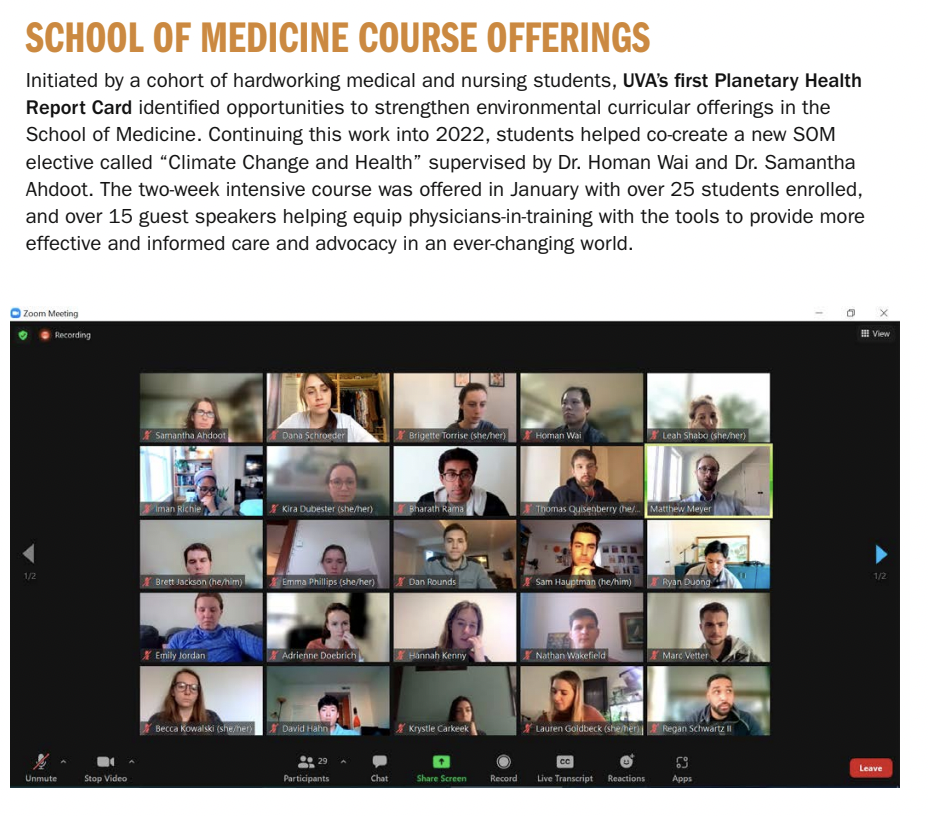
Lena also launched a group, UVA Student Clinicians for Climate Action, which is an affiliate of the national Medical Students for a Sustainable Future. The medical and nursing students participate in community events, such as a tree maintenance event with the Rivanna Conservation Alliance event in November 2022.
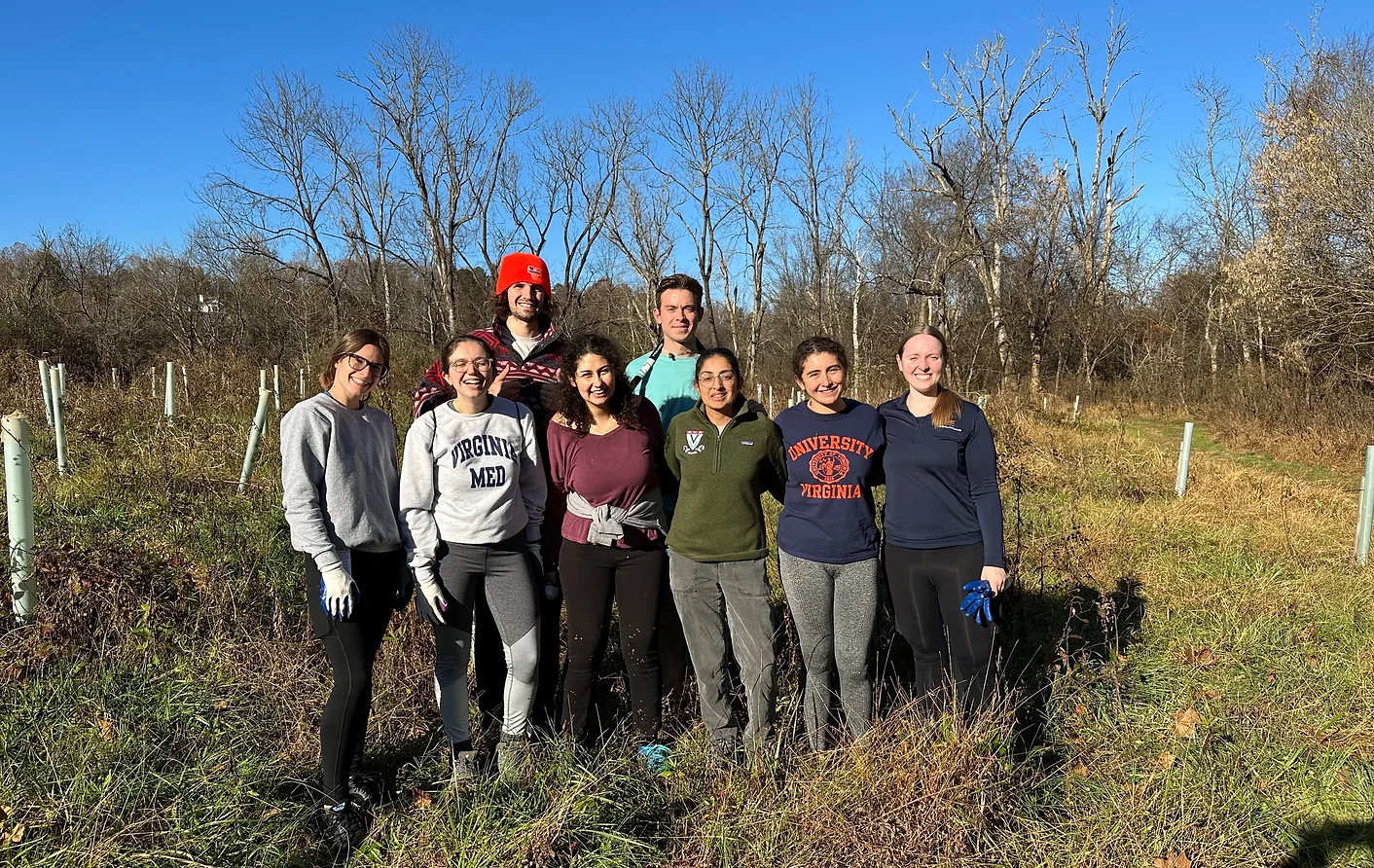
The students joined the Planetary Health Report Card initiative to evaluate the School of Medicine’s commitment to planetary health from year to year. The metrics include 1) planetary health curriculum, 2) interdisciplinary research in health and the environment, 3) university support for student planetary health initiatives, 4) community outreach centered on environmental health impact, and 5) sustainability.
An expanding UVA Health System Sustainability Committee is engaging healthcare team members to address significant challenges. U.S. healthcare contributes 8.5% of national greenhouse gas emissions, and our hospitals generate over 29 pounds of waste per patient per day. The Committee has launched several waste reduction programs, including a Greening the OR workgroup. Led by VCCA Steering Committee member Dr. Matthew Meyer, they published a manuscript on operating room waste which was selected as “Best in Surgery,” in the journal Surgery. In a survey of surgeons at UCSF and UVA Health, Dr. Meyer’s lab found that 95% of respondents would change their operating room workflow if it reduced waste.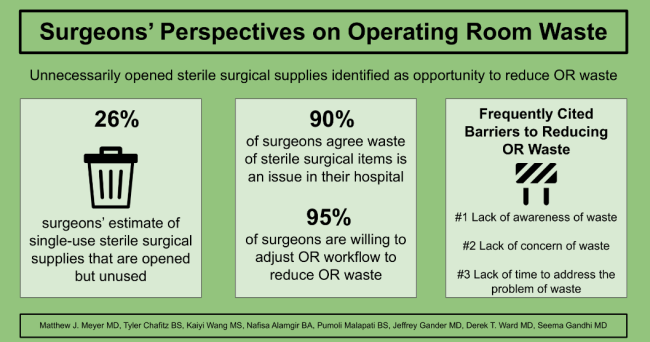
Under the leadership of Linda Hanson and Associate Professor of Nursing Kathryn Reid, UVA School of Nursing launched an annual Protecting Health in A Changing Climate conference in 2021. The 2023 event focused on healthcare sustainability, with an agenda built on Health Care Without Harm’s Global Road Map for Health Care Decarbonization. Following a recorded keynote address from President Ryan, attendees heard from leaders on healthcare energy efficiency, zero-emission infrastructure, sustainably produced foods, supply chain, waste management, and purchasing.
Speakers included UVA’s Kevin Fox and Jesse Warren, who described UVA’s extensive facility sustainability initiatives. The new South Tower, the largest expansion in UVA Health System's modern history, includes a 25,000 square-foot green roof, a grey water reuse system that saves 3.1 million gallons of water yearly, and energy efficiency measures that reduce energy use by 38% compared to the main hospital.
We heard speakers from across Virginia and as far as British Columbia. Mehrdad Gharibnavaz, Energy & Emissions Manager with Providence Health Care, and Alex Hutton, Principal with Swordfern Strategic Sustainability, described their innovative integration of heating and cooling systems as part of the British Columbia Green Care Network. Their holistic approach has resulted in dramatic improvements in occupant health and comfort, energy consumption, and emissions.
Healthcare sustainability work can seem baffling. Our systems of ensuring safety, heating and cooling buildings, ordering supplies, and serving food, have become so infinitely complex and unintuitive that they seem impossible to change. Alex Hutton summarized this challenge well in this slide.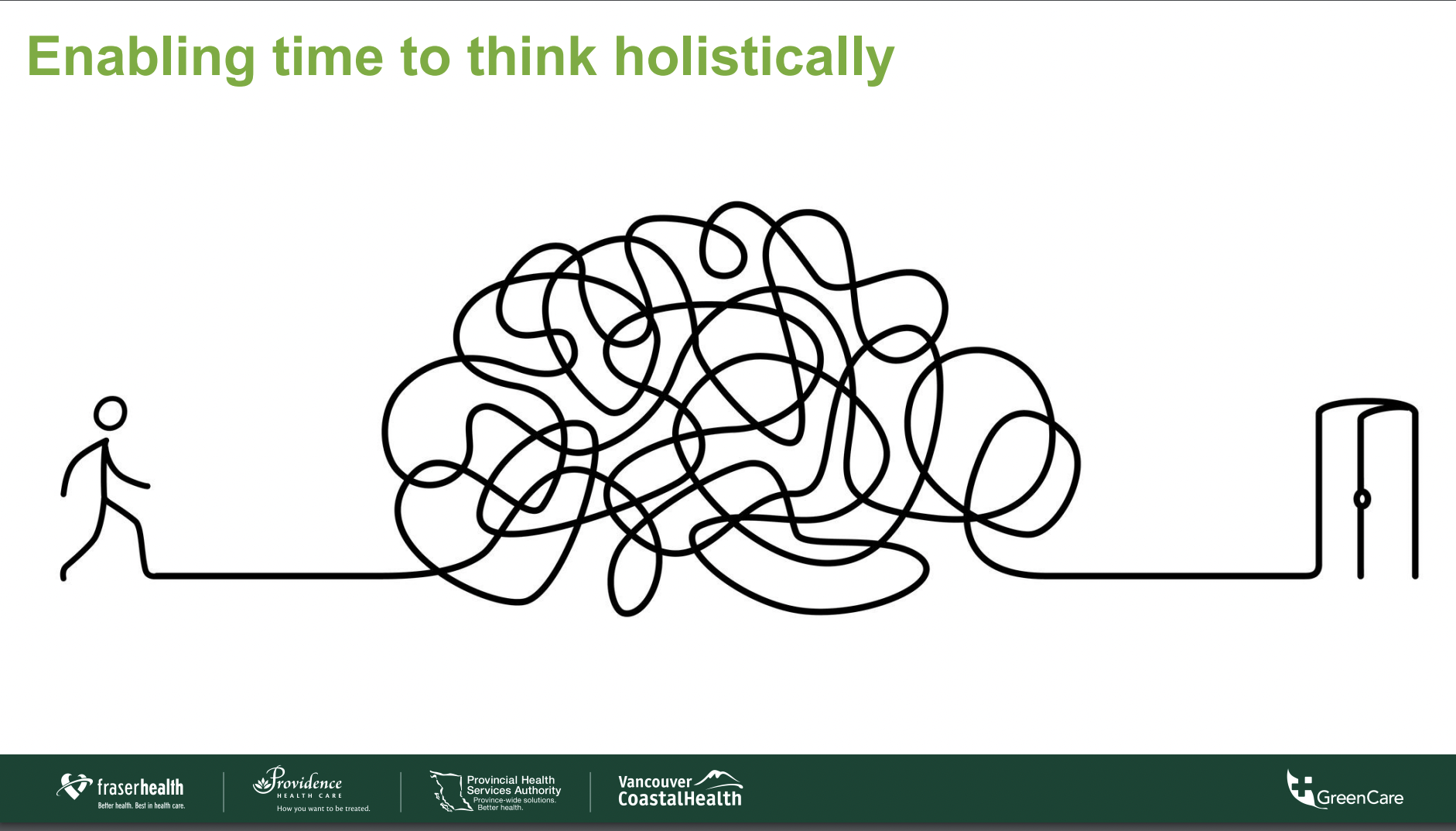
Yet I left the conference with optimism. Across Virginia and the world, smart people are thinking in new ways to solve complex problems. At UVA, Providence Health, Inova, Sentara, Carilion, and Kaiser Permanente, we are slowly changing how we deliver healthcare, transforming our systems to protect our health and our planet. A new vision of healthcare’s future has emerged. Through creativity, collaboration, and caring, it is becoming a reality.
- Testing, Diagnosing, and Treating Primary Aldosteronism: A Leading Cause of Hard-to-Treat Hypertension
- Life at the Top: Climate Change in Utqiaġvik, Alaska
- The Only Thing We Have to Fear is Fear Itself
- UVA Club of Tidewater: Hoos at Harbor Park
- UVA Club of Atlanta: Cavs Care - Volunteer Income Tax Assistance Events
- Virginia Club of New York: WahooLaw - Spring Networking Happy Hour